All new undergraduate students are allocated an advisor.
All new undergraduate students are allocated an advisor. Your advisor is a member of staff in your department who can help you make the most of your time at Queen Mary. They provide guidance for issues you may be experiencing (academic and non-academic).
They can also help you think about where your strengths lie and find out about the opportunities that you may benefit from while studying. You can find the name of your Advisor on MySIS.
Meeting your advisor: What to expect
What is the role of the advisor?
Advising is a fundamental part of the role of academics within Schools and Institutes. Advisors can provide different types of support:
- academic - supporting you to attain academic success and achieve the desired qualification;
- pastoral - supporting you on a more personal level to address difficulties that have an impact on your studies;
- development - supporting your general personal development;
- practical - discussing plans and providing references for applications to further study and/or employment;
Their role is not to be an expert in all aspects of the student experience, but to listen and signpost effectively. Often your Advisor won’t be the best person to support you, but they will help you find the right people at Queen Mary depending on your needs.
What should I expect from my first meeting with my advisor?
Most Advisors will meet their advisees for the first time during Welcome Week often in small groups. This may well be your first meeting with an advisor, and it is ok if you have no idea as to what to expect, or what you are expected to say or do. Here are some ideas of the topics discussed in your first meeting with your advisor:
- introductions, background, reasons for choosing your programme
- transition from your previous study to university
- coming to a new country and institution (international students)
- competencies, past successes, and effort put into previous studies that will help you succeed
- The role of the Advisor, what they can do for you, when and how you can contact them and how they can contact you
What should I expect from this relationship? What are the boundaries?
Your advisor will explain their role in the first meeting. They will help you to understand their role in relation to the other academic staff on your programme team (module convenors, programme lead) and support staff. Your advisor will let you know:
- the ways in which you can contact them
- the turnaround response time you can expect
- the measures in place should they be unable to contact and support you as they had planned to
- the support available in your school (e.g. Student Support Officer) and across Queen Mary
Their role is not one of a counsellor or social worker but one of supporter to provide advice or referral to help you address any difficulties students usually experience in life that may have an impact on your studies. Your advisor should also encourage you to identify for yourself what your goals and challenges are, which will help you take responsibility for your own wellbeing.
Your Advisor should set up meetings with you each Semester. If you would like to talk to them between meetings, please contact them.
How much of what is discussed within an advising meeting is ‘confidential’?
Discussions will be handled sensitively, and your advisor will endeavour to respect your requests for confidentiality. However, they cannot guarantee complete confidentiality. There are circumstances in which confidentiality doesn't apply for example if you disclose a disability or a student or others may be at risk. Your advisor may also ask your permission to link your name with an issue that you have raised.
Will my advisor help me reflect on my progress and the feedback I receive?
Yes. Your advisor can help you critically reflect on your academic progress and the feedback you receive and identify ways to use this feedback constructively in the future.
They can help you to determine actions for example, time management, objectives, priorities, goals and next steps. This supported process will help you take responsibility for your own learning.
What other support is available for me?
In addition to your Advisor, there is a wide range of support available for you. Find details of our support services at Life on campus and Becoming a Queen Mary student.
Every School and Institute has a dedicated Student Support Officer who can provide advice on issues impacting your studies as well as details of your Advisor.
